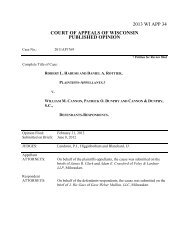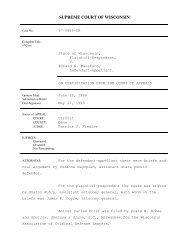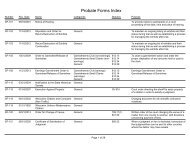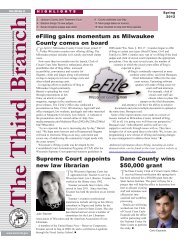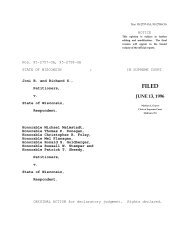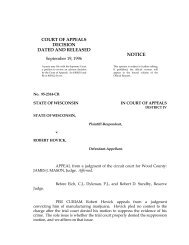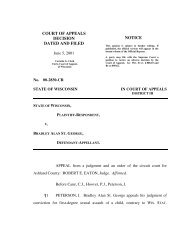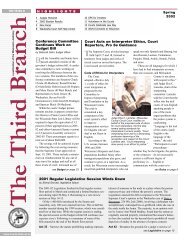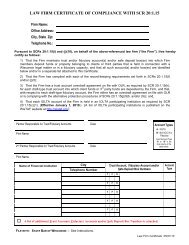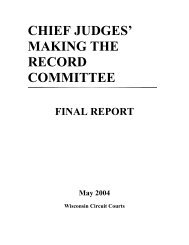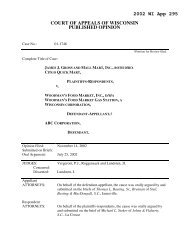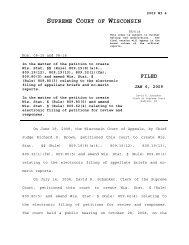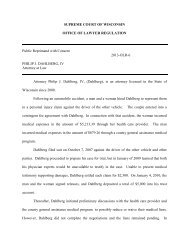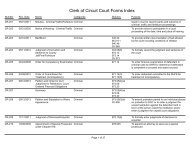Third Branch, srping 2010 - Wisconsin Court System
Third Branch, srping 2010 - Wisconsin Court System
Third Branch, srping 2010 - Wisconsin Court System
You also want an ePaper? Increase the reach of your titles
YUMPU automatically turns print PDFs into web optimized ePapers that Google loves.
6Spring<strong>2010</strong>THE THIRD BRANCHCriminal justice mental health task forcebegins workBy Theresa Owens, Executive Assistant to the Chief JusticeAnew statewide task force that will focus on improvingthe criminal justice system’s response to people withmental illness began its work with a summit in Madison onMarch 11.Chief Justice Shirley S. Abrahamson convened the taskforce to do three things: (1) identify current programs andinitiatives operating across the state, (2) analyze gaps in themental health and criminal justice systems, and (3) developa best-practices model of evidence-based, cost-effectiveinterventions that can be implemented early to improveresponses to people with mental illness.By Ann Zimmerman, Statewide Pro Se CoordinatorThe Supreme <strong>Court</strong> Planning and Policy AdvisoryCommittee (PPAC) voted in March to establish a newsubcommittee to focus on limited scope representation. Itswork will begin in the coming months.Limited scope representation is an attorney-clientrelationship in which the lawyer does some, but not all, ofthe work involved in the case. The client handles theremaining tasks on his or her own, sometimes with coachingfrom the lawyer. This allows otherwise self-representedlitigants, who may not be able to afford full-servicerepresentation, to obtain some legal assistance targetedwhere they need it most. Limited scope representation canalso improve court effectiveness and efficiency in that selfrepresentedlitigants may be better prepared and rely less oncourt staff.Chief Justice Shirley S. Abrahamson supported PPAC’sdecision to form the subcommittee.“For both the courts and the bar, we must identify modelsthat will help lawyers expand their ability to providenecessary legal services to litigants who cannot afford fullservicerepresentation or who want to represent themselves,”she said. “Many states have found that limited scoperepresentation can be a useful option when encouraged byThis project is part of a national effort called the ChiefJustices’ Criminal Justice Mental Health LeadershipInitiative. The Council of State Governments’ Justice Centerselected <strong>Wisconsin</strong> through a competitive process toparticipate. The Chief Justice Initiative is a national projectdesigned to encourage collaborative efforts and assist statesupreme court justices in guiding efforts in their state toimprove the response to people with mental illnesses in thecriminal justice system.see Task force on page 16PPAC creates Limited Scope RepresentationSubcommitteeA $5,000 grant from the State Bar Legal AssistanceCommittee to Judicare will help to launch a pilot program toenable eligible Judicare clients to ask questions of pro bonoattorneys online.The Internet legal advice system will rely upon anadministrator and volunteer attorneys. Judicare will fill theadministrator role and the <strong>Wisconsin</strong> Tenth District Self-Represented Litigants Committee will assist Judicare inrecruiting attorneys and publicizing the Web site.The program will make use of software designed by LegalServices of Northern Michigan and Legal Services ofNorthwest Minnesota to create a Web site where selfrepresentedlitigants and residents with unmet legal needscan receive legal advice. The grant money will be used tothe courts and bar and supported with training, riskmanagementmaterials and court rules and forms.”Since 2004, PPAC has consistently identified as a toppriority the issue of self-represented litigation, and inresponse the <strong>Wisconsin</strong> court system has implemented aspectrum of initiatives to provide self-represented litigantsaccess to justice and effectively manage internal resources.These initiatives include statewide pro se forms, judicialeducation and court staff training programs, collaborativepartnerships with public libraries and technology-basedresources for court staff and litigants.The new subcommittee will research and discuss thefeasibility of developing a statewide limited scoperepresentation program and make recommendations toPPAC. Research will help to document current efforts in thisarea throughout the state and nation with a focus onidentifying gaps and avoiding duplication of work alreadyunderway. •For further information, contact Ann Zimmerman at (608)261-8297 or ann.zimmerman@wicourts.gov or Shelly L.Cyrulik at (608) 266-8861 or michelle.cyrulik@wicourts.gov.Pilot program will help answer legalquestions onlinemodify the software for use in <strong>Wisconsin</strong>, to recruitvolunteer attorneys and to publicize the Web site.“This project is an excellent example of how civil equaljustice in <strong>Wisconsin</strong> can be achieved for disadvantagedpeople and communities through the collaborative efforts oflawyers, courts and other organizations,” said ChippewaCounty Clerk of Circuit <strong>Court</strong> Karen Hepfler, chair of theTenth District Self-Represented Litigants Committee.The 18-month pilot will initially target eligible Judicareclients in four northern counties in the Tenth JudicialDistrict: Ashland, Bayfield, Sawyer and Washburn. Ifsuccessful, it will likely be extended into other judicialdistricts covered by Judicare. •



